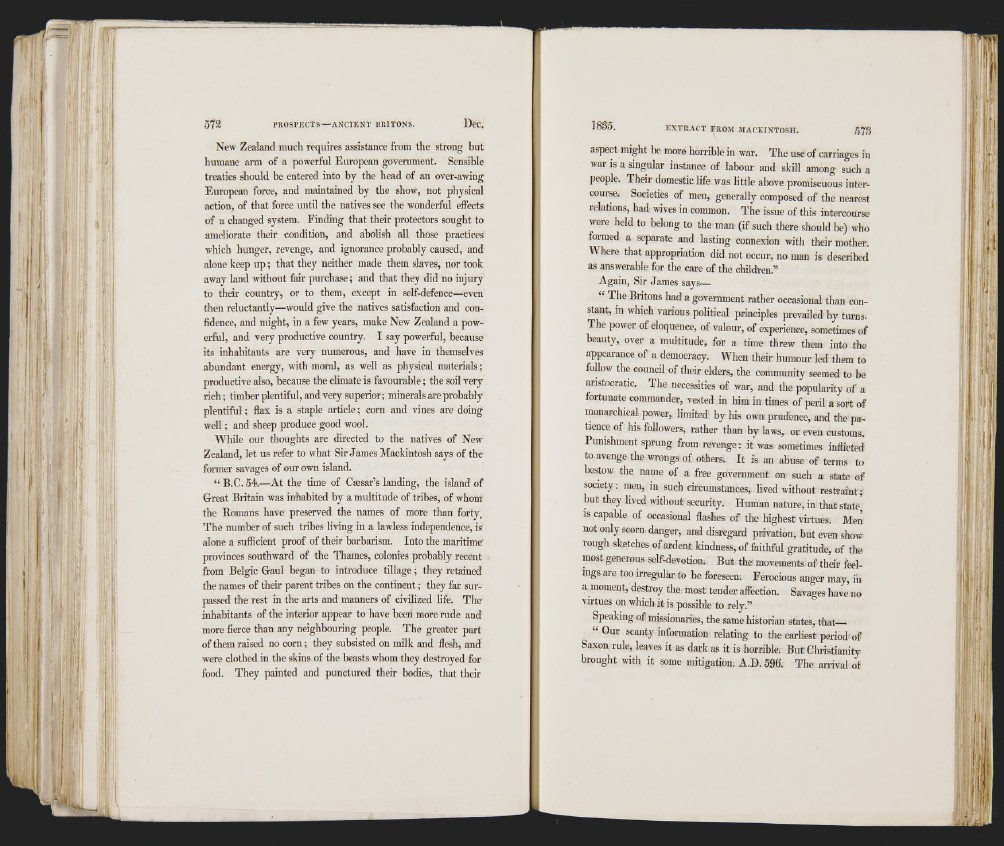
a
li -*0
,;i:i
a I ' l
,81
'■fli i
1.1,
572 PROSPECTS— ANCIENT BRITONS.
New Zealand much requires assistance from the strong but
humane arm of a powerful European government. Sensible
treaties should be entered into by the head of an over-awing
European force, and maintained by the show, not physical
action, of that force until the natives see the wonderful effects
of a changed system. Finding that their protectors sought to
ameliorate their condition, and abolish all those practices
which hunger, revenge, and ignorance probably caused, and
alone keep u p ; that they neither made them slaves, nor took
away land without fair purchase; and that they did no injury
to their country, or to them, except in self-defence—even
then reluctantly—would give the natives satisfaction and confidence,
and might, in a few years, make New Zealand a powerful,
and very productive country. I say powerful, because
its inhabitants are very numerous, and have in themselves
abundant energy, with moral, as well as physical materials;
productive also, because the climate is favourable; the soil very
rich; timberplentiful, and very superior; minerals are probably
plentiful; flax is a staple article; corn and vines are doing
well; and sheep produce good wool.
While our thoughts are directed to the natives of New
Zealand, let us refer to what Sir James Mackintosh says of the
former savages of our own island.
“ B.C. 54.—At the time of C®sars landing, the island of
Great Britain was inhabited by a multitude of tribes, of whom
the Romans have preserved the names of more than forty.
The number of such tribes living in a lawless independence, is
alone a sufficient proof of their barbarism. Into the maritime
provinces southward of the Thames, colonies probably recent
from Belgic Gaul began to introduce tillage; they retained
the names of their parent trihes on the continent; they far surpassed
the rest in the arts and manners of civilized life. The
inhabitants of the interior appear to have been more rude and
more fierce than any neighbouring people. The greater part
of them raised no com; they subsisted on milk and flesh, and
were clothed in the skins of the beasts whom they destroyed for
food. They painted and punctured their bodies, that their
aspect might be more horrible in war. The use of carriages in
war is a singular instance of labour and skill among such a
people. Their domestic life was little above promiscuous intercourse.
Societies of men, generally composed of the nearest
relations, had wives in common. The issue of this intercourse
were held to belong to the man (if such there should be) who
formed a separate and lasting connexion with their mother.
Where that appropriation did not occur, no man is described
as answerable for the care of the children.”
Again, Sir James says—
“ The Britons had a government rather occasional than constant,
in which various political principles prevailed by turns.
The power of eloquence, of valour, of experience, sometimes of
beauty, over a multitude, for a time threw them into the
appearance of a democracy. When their humour led them to
follow the council of their elders, the community seemed to be
aristocratic. The necessities of war, and the popularity of a
fortunate commander, vested in him in times of peril a sort of
monarchical power, limited by his own prudence, and the patience
of his followers, rather than by laws, or even customs.
Punishment sprung from revenge: it was sometimes inflicted
to avenge the wrongs of others. It is an abuse of terms to
bestow the name of a free government on such a state of
society: men, in such circumstances, lived without restraint ■;
but they lived without security. Human nature, in that state’
IS capable of occasional flashes of the highest virtues. Men
not only scorn danger, and disreg-ard privation, but even show
rough sketches of ardent kindness, of faithful gratitude, of the
most generous self-devotion. But the movements of their feelings
are too trregulkr to be foreseen. Ferocious anger may, in
a moment, destroy the most tender affection. Savages have no
virtues on which it is possible to rely.”
Speaking of missionaries, the same historian states, that—
“ Our scanty information relating to the earliest period of
Saxon rule, leaves it as dark as it is horrible. But Christianity
brought with it some mitigation. A.D. 596. The arrival of
Mi'
ij
I
il